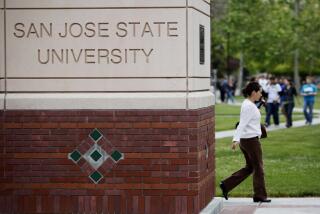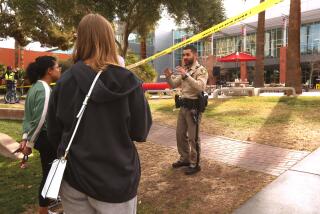Murdered Ex-Professor Knew He Risked Assassination in El Salvador
- Share via
LONG BEACH — With three other men, retired Cal State Long Beach philosophy professor Francisco L. Peccorini recently announced plans to start a philosophical journal critical of communism in his native El Salvador.
A month ago, one of the other men was assassinated there, causing the survivors to move their office to a secret location.
But last week, an assassin found a way to murder Peccorini, too.
During his final visit to the campus, recalled Daniel Guerriere, another philosophy professor who for 15 years shared an office with Peccorini, “he said to me, ‘I know they may try to assassinate me, but it’s in God’s hands.’ ”
Guerriere and other Cal State professors reacted with sadness but not surprise when they learned that their former colleague had died apparently at the hands of Salvadorean leftist guerrillas.
“There are a lot of shaken people on campus today,” said university spokeswoman Toni Beron.
But even in the wake of such recent incidents as the threat against “Satanic Verses” author Salman Rushdie and a suspected terrorist bombing in San Diego, many professors said the death of Peccorini has enhanced rather than diminished their commitment to free speech.
“I feel even more compelled to speak out,” said Virginia Ringer, a long-time friend of Peccorini. “It’s safer here (than in El Salvador), but even if it were more dangerous I would speak out. If not, there’s no use in living.”
Peccorini, an outspoken anti-communist, was gunned down Wednesday while driving on a busy street in the Salvadorean capital of San Salvador. Police said a man, believed to be a member of the left-wing Farabundo Marti National Liberation Front, shot the professor three times in the chest with a silencer-equipped pistol. Peccorini died later in a hospital.
A former Jesuit priest who was born in El Salvador and educated in Spain, Peccorini, 73, had taught philosophy--specifically courses in ethics and metaphysics--at CSULB from 1966 to 1986. Upon his retirement three years ago, colleagues said, he had returned to his native country where he had become an increasingly vocal opponent of the Christian Democratic government and of leftist political movements that he charged with aiding El Salvador’s Marxist guerrillas.
During a visit to Long Beach last summer, colleagues said, Peccorini seemed to downplay their warnings that he might be setting himself up as a potential victim of political violence. “I told him that he shouldn’t go back there,” said William Bonis, another professor and friend, “and he said, no, that he was safe.”
But during another visit two weeks ago, friends recalled, the retired professor had a more sobering assessment of his situation. By that time, they said, Peccorini had become a well-known figure in El Salvador through his newspaper writings, television appearances and public debates with communists.
“He was a man with the intellectual, moral and religious credentials to counterbalance the high level clergy who are pro-communist,” Guerriere said. “He was recognized in the streets by many people who were grateful to him.”
Peccorini returned to El Salvador two weeks ago, colleagues said, to participate in today’s presidential elections, leaving behind his wife, Teresa, and a stepdaughter who lives in Cerritos.
Teresa Peccorini, upon learning of her husband’s death, returned immediately to San Salvador. Friends and colleagues at the university, meanwhile, say they are planning a memorial for the slain professor, but have not yet set a date.
“He was a very gentle, jovial man,” Bonis said, “dedicated to philosophy, appreciated by his students and loved by his colleagues.”
Said Ringer: “He was a man of peace who thought that maybe his voice could make a difference. ‘If you believe in democracy,’ he said, ‘you’ve got to exercise it or it will never be a reality. People,’ he said, ‘have to be brave enough to stand and fight for their countries.’ ”
More to Read
Sign up for Essential California
The most important California stories and recommendations in your inbox every morning.
You may occasionally receive promotional content from the Los Angeles Times.













